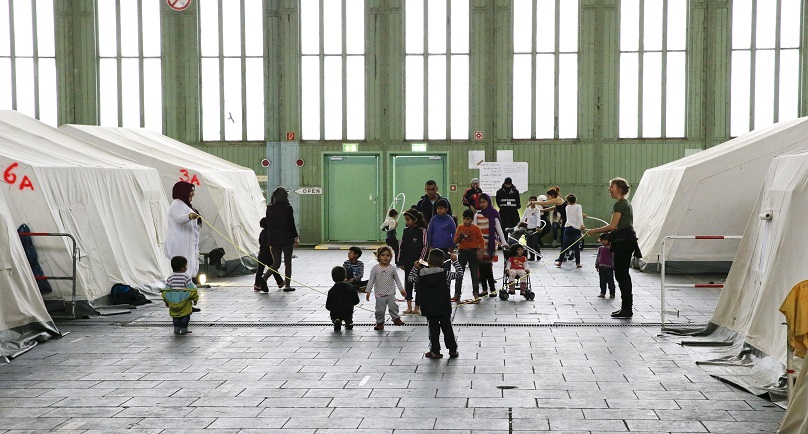Image: Children of migrants play next to tents in a shelter for migrants inside a hangar of the former Tempelhof airport in Berlin, Germany, December 9, 2015. REUTERS/Fabrizio Bensch
BERLIN (Reuters) – Germany launched a programme on Monday to improve the safety of asylum-seeking women and the roughly 300,000 refugee children who have arrived here this year, saying these vulnerable groups were not being given sufficient protection in refugee homes.
Almost a million refugees fleeing war, violence and poverty in countries like Syria, Iraq and Afghanistan flocked to Germany in the first 11 months of this year and the authorities have had difficulty finding sufficient accommodation for them all. Some have ended up sleeping in sports hall and empty office blocks.
In assessing the situation, the German government and United Nations children’s agency (UNICEF) agreed that children living in refugee shelters were at risk of becoming victims of violence, misuse and exploitation, especially in temporary accommodation and reception centres.
“After their long and often dangerous flight, refugee children in Germany are in a relatively safe place,” said Christian Schneider, executive director of UNICEF Germany.
“Countless staff and volunteers are doing a fantastic job. However, there are no binding standards for the protection of children,” he said in a statement.
German Family Minister Manuela Schwesig told journalists that there were some cases of staff and volunteers at refugee accommodation assaulting children.
She said a recent UNICEF report showed that there were some documented incidents of violence, rape and sexual attacks in centres for new arrivals as well as suspected cases of sexual exploitation of women and girls.
She said there were no statistics on how often women and children were becoming victims of such attacks, with very few reporting such incidents due to concerns that this could affect their asylum application or that they might be blamed.
Refugee homes need to be fitted with protected rooms for children and separate sanitary facilities for men and women, Schwesig said in presenting a three-pronged plan to improve the safety of refugee women and children.
One of the measures is a plan for the family ministry and the KfW state development bank to provide up to 200 million euros ($220.40 million) in investment loans to build new refugee accommodation and modify existing shelters so that women and children can be better protected.
A second measure will see the ministry work with UNICEF to train people who work at refugee homes in child protection and how to spot incidents of sexual violence.
Thirdly, the ministry said it would provide centres for torture victims with 4 million euros to ensure that refugee women who have experienced violence are well looked after.
($1 = 0.9074 euros)
(Reporting by Michelle Martin; Editing by Mark Heinrich)
Copyright 2015 Thomson Reuters. Click for Restrictions.


